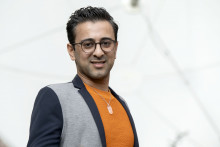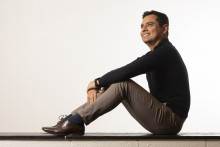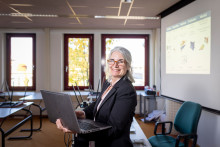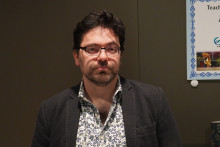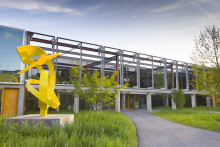‘People often ask me why I entered academia and I always tell them the same story. My grandfather was a teacher and my father is a university professor, so it is sort of a family business. I attended primary school in Japan, because my father was doing a PhD there, and I was doing well, but then we returned to Iran and my school grades dropped. There were no expectations for me to go to university. However, I got accepted to study mining engineering in my home town. I was interested in doing a Master abroad, but it wasn’t possible for me to leave the country if I didn’t do my military service first. The only way to postpone the military service was to attend a university in Iran. I continued studying mining engineering and I did very well. I got the highest rated thesis in the history of the university. Afterwards I searched for opportunities abroad and my supervisors recommended ITC, because it was the best in the field. Exactly one week before I had to start my military service, I received the acceptation letter from ITC which allowed me to leave Iran and come here.’
Fardad Maghsoudi Moud
PhD research topic: Quantitative models for porphyry copper exploration
Works at: Applied Earth Sciences department, Faculty of Geo-Information Science and Earth Observation (ITC)
Studied: Mining Engineering, Isfahan University of Technology (Iran)
Originally from: Iran
‘I have been an externally funded PhD, which wasn’t always easy. As soon as I came here, the exchange rate of euro kept increasing, which meant a lot more costs. There was a heavy pressure on me. I didn’t know if I should stay or leave and prevent extra costs on my father. It was very hard, I was definitely thinking of leaving in the first year, but I must thank ITC. They gave me a scholarship in the end, which allowed me to stay.’

‘My specialization is mineral exploration – also known as economic geology. My research is about modeling copper content of rocks and soils by using satellite images, airborne magnetometry and gamma-ray spectroradiometry, and geochemistry. Metals such as gold and copper are of course highly demanded, but difficult to discover. Many companies just start drilling at a promising location and hope for the best, but drilling is very expensive. I’d like to help cut it down. In my work I combine lab analysis and remote sensing products - satellite images and airborne geophysics - and now, after four years of doctoral research, I can say: I have a method to predict gold and copper content in a specific region. I have discovered a set of quantitative relationships between gold and copper with their surroundings based on the remote sensing products, and I’m able to predict where we should drill with better certainty. These models are not applicable everywhere, but merely for areas in Turkey, Iran and Pakistan.’
‘I have a method to predict gold and copper content in a specific region’
‘When you talk about gold and copper, it is of course always interesting. Copper is used in so many devices and objects that we need every day – wires, our phones, our glasses. I like my field, because it is all about discovery and exploration. Satellite images allow you to see what our eyes cannot. Looking at the images is like admiring art. Earth is so beautiful.’
‘I’m only a few days away from finishing my PhD, so I’m very close to the finish line. It was a tough journey. Moving to a foreign country with a different culture. Living alone for the first time. It was a big challenge for me. I haven’t seen my family for four years, since I started my PhD. I always remember this saying ‘the best never rest’, so I tried to work hard and kept going. And I’m very happy with the outcome. I truly discovered myself during my PhD. I learnt a lot. I think differently, I’m much more critical, I learnt to be patient. I’m very proud of my personal development. It means even more to me than getting the degree. Learning to live alone and developing myself was the main gain of this journey. I’m super proud of myself. I know how far I can push myself and that nothing is impossible.’
‘I’m super proud of myself’
‘The advice I’d give to other doctoral candidates is: keep the spirit up, do your best and never ever quit. Remember that the best never rest. Work for what you want and don’t give up. It’s all about training your mind and keeping a good mindset. I have also learnt that people around you are extremely important. Without my family and close friends, it would be all very complicated and stressful. I’m only days away from finishing my PhD, but I don’t feel any stress because I’m surrounded by good people who are supporting me.’

‘I’m not planning to go back to Iran now because, once I graduate, I’m officially a soldier and should report for duty. I got a postdoc position at TU Delft, which I’m very happy with. I will be working on coal mine waste characterization in a project funded by the EU Commission. I don’t know what will happen afterwards, but I’d love to stay in science. Like I said: it’s the family business and I’d love to keep running it.’


